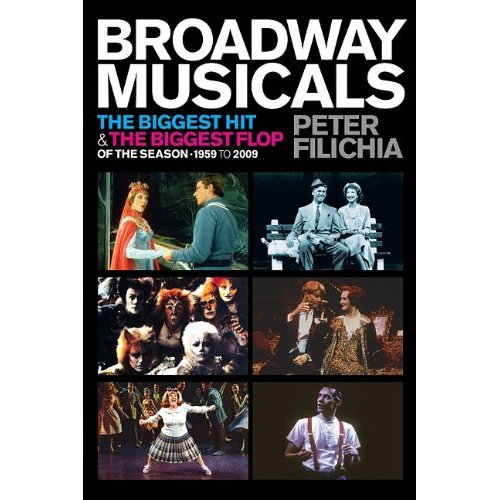In Broadway Musicals: The Biggest Hit & The Biggest Flop of the Season, critic/columnist/author Peter Filichia took it upon himself to examine the Broadway musicals of the last half century, putting together his personal list for the biggest hit and flop of each year. Now, that’s not to say his list is a best and worst sort of deal; he’s more interested in which show was the biggest success or the biggest fall from grace. He offers analysis of the shows, plus some unique perspectives on the material. On some of the biggest hits of all time, he offers some suggestions that might have made the show better. There are a couple of hits that he clearly has little love for, as well. With financial success as the most critical factor, it’s much easier to pinpoint the break-out hits of the season than failures. In dealing with the flops, he also takes into consideration critical response, award recognition, and most importantly, expectations.
From 1959-2009, he gives us glimpses not only into the good and bad, but also into the shifts in sensibilities and styles over the years. Also, Filichia spices up his conversation by following the traditional definition of a Broadway season June 1 to May 31 – not the Tony season, which means that some Best Musical winners end up in a face-off.
A couple quick examples: I found myself nodding in agreement with Peter’s assessment of 1776, for which he makes an incredible valid argument that it has the greatest libretto of all time (and gives his reasons why it trumps Gypsy in his estimation, too). On the other hand, I wasn’t as enthralled with 1969-70’s greatest hit, Applause, which he listed certain attributes to defend it in comparison to the film. (Not saying he prefers the show, but just pointing out certain strengths). But I think we can both agree it’s not an especially revivable property (After that Encores! concert, I wouldn’t mind if I never saw it again). It’s his opinion, for sure, but his statements are valid and he is able to back them all up.
He goes into the some greater detail with the flops, running the gamut from The Pink Jungle, a camp mess starring Ginger Rogers and Agnes Moorehead that folded out of town to 9 to 5. Frankly, it is usually more interesting reading how it all went wrong than right, which is part of the appeal for flop enthusiasts like myself. There are even a couple of shows listed here that I knew nothing about, particularly one that closed before rehearsals even started. More shows fail than succeed, and therefore there are some years where he weighs several different options before settling on his final choice. There are also some interesting correlations as creative staffs find themselves with the biggest hit one season..then the biggest failure some time later. (There are also three musical sequels on the list). Stephen Sondheim isn’t represented in the biggest hits column, but has three shows in the failure column. As a consolation, Peter allows the composer/lyricist the final word. And, yes, 1600 Pennsylvania Avenue makes the cut, and not without the requisite praise for Patricia Routledge’s “Duet for One.”
The book makes for a rather quick, engaging read, each show receives similar treatment to the flops in Ken Mandelbaum’s Not Since Carrie, a compilation of essays. It’s well-researched, but I know for fact that Peter has seen many of the shows he talks about himself. His recall is impressive and can pretty much remember every single show he has seen. There are a couple of small errors here and there but nothing extraordinary (if Applause Books wants to hire me to proofread, I’m available). If you read the book, I also encourage you dropping Peter an email; not only is he incredibly gracious but he gladly welcomes the conversation (We’ve been in contact for over eight years now, starting when I was a freshman in college!).
And finally, whether or not he chose Prettybelle or Lolita My Love as the biggest flop of 1970-71, well, I don’t want to spoil everything…

